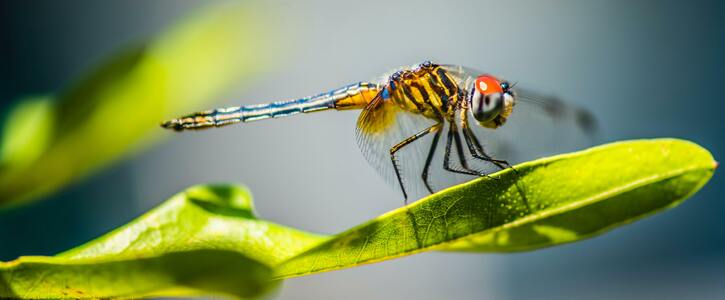25 signatures reached
To: The Government of Western Australia, Department of Health & Environmental Health Officer
Are you fogging kidding me? Let’s create a cleaner, chemically free Exmouth together.

The Exmouth Community is calling on The Government of Western Australia, Department of Health & Environmental Health Officer to stop using harmful fogging practices in Exmouth. We are calling for a ban on fogging immediately, before it is too late.
While the World Health Organisation recommends fogging to tackle an epidemic or emergencies, fogging can gravely affect our health and negatively impact the environment, including our oceanic ecosystem. Fogging is not selective and will also kill native bees and natural predators to mosquitos, such as dragon flies.
While the World Health Organisation recommends fogging to tackle an epidemic or emergencies, fogging can gravely affect our health and negatively impact the environment, including our oceanic ecosystem. Fogging is not selective and will also kill native bees and natural predators to mosquitos, such as dragon flies.
Why is this important?
There are a number of reasons why we should ban fogging in Exmouth, Western Australia:
1. Fogging is ineffective - Fogging is only moderately effective in the control of the mosquito population. For each adult mosquito killed, many more larvae in the water remain unaffected. Fogging kills the adults and that gives temporary relief for the day. But the breeding source nearby is not affected, and the next day there will be more adults that can continue to breed and infect us. Reducing the number of larvae is a more effective measure, which means that oiling achieves better results than fogging. 0.1% of sprayed pesticides actually hit the target pest - 99.9 % go off into the environment (Pimentel, D. PhD., BioScience) The pesticides are actually negatively affecting our bird, bee (including native bee), and dragonfly population more than the mosquito population. The risks on our oceanic ecosystem and marine life is also largely unknown.
2. Fogging is toxic to our health - the pesticides used in vector control are neurotoxins and have been linked to adverse effects in humans. Ingredients used in mosquito fogging - malathion mixed with diesel - are powerful neurotoxins, carcinogenic and endocrine disruptors. Exposure to neurotoxins, even in low quantities, is also associated with numbness of the lips and tongue, nausea, headaches and respiratory problems. For these reasons, many countries have banned open-air fogging completely.
Pregnant women, fetuses, infants, and children have a greater risk of getting sick from pesticides. Our children and grandchildren are exposed to these pesticides just by playing on our lawns once the fogging is complete. Airborne pesticides are particularly harmful as they may be easily ingested by humans and wildlife. Pesticide residue can also be left behind on items kept outdoors, such as children’s toys and outdoor furniture, or tracked inside on shoes. Children, the elderly, and the chronically ill are at greatest risk from chemically induced immune suppression. (World Resources Institute) Children have a greater risk of developing asthma by age five after pesticide exposure within the first year of life.
3. Fogging is also toxic to other insects and animals, such as butterflies, dragonflies and bees - these beautiful insects are particularly sensitive to pesticides. Malathion is highly toxic to bees and other beneficial insects, some fish, and other aquatic life. When bee populations are greatly affected by pesticides, food production in the area could be affected because of the lack of pollination. Pesticides are also harmful to many other animals, including those that are natural predators of mosquitoes. Most pesticides used in fogging are toxic to fish, which are very important for the eradication of mosquito larvae. Frogs, geckos and birds, which also eat mosquitoes, could also be affected by pesticides.
We would like to suggest the following alternatives to fogging:
1. Responsible housekeeping and maintenance -Remove all sources of stagnant or standing water if possible. The eradication of breeding grounds in personal and commercial spaces are much more effective tools in the fight against Ross River virus and Barman Forest virus than widespread fogging is.
2. Relocating the budget to spending the money to destroy and control breeding zones, rather than on fogging. Safe alternatives exist such as garlic and cedar sprays which can last for a month. This should also decrease the current expense that the Health Department currently accrue.
3. Replacing pesticides with natural mosquito repellents such as garlic, peppermint or lemon oils or citrus-based sprays. Turpentine and eucalyptus oils, garlic extracts, surface oils, extracts of orange and lemon peel will all control mosquito larvae. Cinnamon Oil is better for repelling mosquitoes than what is being used.
4. Increasing community effort - The responsibility for eliminating breeding grounds in one’s own home and garden, while reporting possible breeding sites in public spaces to the relevant authorities, lies with everybody. We all need to play our part to keep the mosquito breeding grounds at bay.
5. Increasing and protecting the number of mosquito predators, such as dragonflies and bats, which are both highly effective ways of controlling mosquitoes naturally. The spraying of pesticides kills those natural predators as well as mosquitoes, and because mosquitoes have a shorter reproductive cycle than their predators, following every spraying there are more mosquitoes than there were before, as a number of studies have shown. If you need to control mosquitoes, do not spray; instead, remove standing water (in which mosquitoes breed) and consider introducing dragonflies to the area.
Did you know:
o A single bat can eat between 6000 to 8000 insects each night.
o A single frog can eat over 100 insects in one night.
o Dragonflies can eat 30 to 100s mosquitoes per day.
The Exmouth Community are strongly advocating for the use of an effective and non-toxic method for reducing the risk of mosquito borne illnesses in Exmouth. Until a safer solution is researched and implemented, we are requesting that further fogging be put on hold.
1. Fogging is ineffective - Fogging is only moderately effective in the control of the mosquito population. For each adult mosquito killed, many more larvae in the water remain unaffected. Fogging kills the adults and that gives temporary relief for the day. But the breeding source nearby is not affected, and the next day there will be more adults that can continue to breed and infect us. Reducing the number of larvae is a more effective measure, which means that oiling achieves better results than fogging. 0.1% of sprayed pesticides actually hit the target pest - 99.9 % go off into the environment (Pimentel, D. PhD., BioScience) The pesticides are actually negatively affecting our bird, bee (including native bee), and dragonfly population more than the mosquito population. The risks on our oceanic ecosystem and marine life is also largely unknown.
2. Fogging is toxic to our health - the pesticides used in vector control are neurotoxins and have been linked to adverse effects in humans. Ingredients used in mosquito fogging - malathion mixed with diesel - are powerful neurotoxins, carcinogenic and endocrine disruptors. Exposure to neurotoxins, even in low quantities, is also associated with numbness of the lips and tongue, nausea, headaches and respiratory problems. For these reasons, many countries have banned open-air fogging completely.
Pregnant women, fetuses, infants, and children have a greater risk of getting sick from pesticides. Our children and grandchildren are exposed to these pesticides just by playing on our lawns once the fogging is complete. Airborne pesticides are particularly harmful as they may be easily ingested by humans and wildlife. Pesticide residue can also be left behind on items kept outdoors, such as children’s toys and outdoor furniture, or tracked inside on shoes. Children, the elderly, and the chronically ill are at greatest risk from chemically induced immune suppression. (World Resources Institute) Children have a greater risk of developing asthma by age five after pesticide exposure within the first year of life.
3. Fogging is also toxic to other insects and animals, such as butterflies, dragonflies and bees - these beautiful insects are particularly sensitive to pesticides. Malathion is highly toxic to bees and other beneficial insects, some fish, and other aquatic life. When bee populations are greatly affected by pesticides, food production in the area could be affected because of the lack of pollination. Pesticides are also harmful to many other animals, including those that are natural predators of mosquitoes. Most pesticides used in fogging are toxic to fish, which are very important for the eradication of mosquito larvae. Frogs, geckos and birds, which also eat mosquitoes, could also be affected by pesticides.
We would like to suggest the following alternatives to fogging:
1. Responsible housekeeping and maintenance -Remove all sources of stagnant or standing water if possible. The eradication of breeding grounds in personal and commercial spaces are much more effective tools in the fight against Ross River virus and Barman Forest virus than widespread fogging is.
2. Relocating the budget to spending the money to destroy and control breeding zones, rather than on fogging. Safe alternatives exist such as garlic and cedar sprays which can last for a month. This should also decrease the current expense that the Health Department currently accrue.
3. Replacing pesticides with natural mosquito repellents such as garlic, peppermint or lemon oils or citrus-based sprays. Turpentine and eucalyptus oils, garlic extracts, surface oils, extracts of orange and lemon peel will all control mosquito larvae. Cinnamon Oil is better for repelling mosquitoes than what is being used.
4. Increasing community effort - The responsibility for eliminating breeding grounds in one’s own home and garden, while reporting possible breeding sites in public spaces to the relevant authorities, lies with everybody. We all need to play our part to keep the mosquito breeding grounds at bay.
5. Increasing and protecting the number of mosquito predators, such as dragonflies and bats, which are both highly effective ways of controlling mosquitoes naturally. The spraying of pesticides kills those natural predators as well as mosquitoes, and because mosquitoes have a shorter reproductive cycle than their predators, following every spraying there are more mosquitoes than there were before, as a number of studies have shown. If you need to control mosquitoes, do not spray; instead, remove standing water (in which mosquitoes breed) and consider introducing dragonflies to the area.
Did you know:
o A single bat can eat between 6000 to 8000 insects each night.
o A single frog can eat over 100 insects in one night.
o Dragonflies can eat 30 to 100s mosquitoes per day.
The Exmouth Community are strongly advocating for the use of an effective and non-toxic method for reducing the risk of mosquito borne illnesses in Exmouth. Until a safer solution is researched and implemented, we are requesting that further fogging be put on hold.

